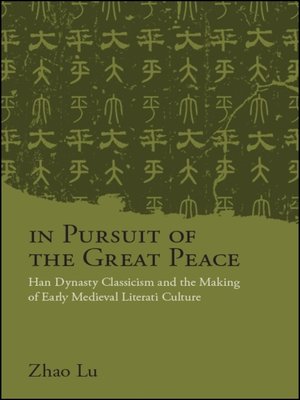In Pursuit of the Great Peace
ebook ∣ Han Dynasty Classicism and the Making of Early Medieval Literati Culture · SUNY Series in Chinese Philosophy and Culture
By Lu Zhao

Sign up to save your library
With an OverDrive account, you can save your favorite libraries for at-a-glance information about availability. Find out more about OverDrive accounts.
Find this title in Libby, the library reading app by OverDrive.



Search for a digital library with this title
Title found at these libraries:
| Library Name | Distance |
|---|---|
| Loading... |
Examines the Great Peace (taiping), one of the first utopian visions in Chinese history, and its impact on literati lives in Han China.
Through an examination of the Great Peace (taiping), one of the first utopian visions in Chinese history, Zhao Lu describes the transformation of literati culture that occurred during the Han Dynasty. Driven by anxiety over losing the mandate of Heaven, the imperial court encouraged classicism in order to establish the Great Peace and follow Heaven's will. But instead of treating the literati as puppets of competing and imagined lineages, Zhao uses sociological methods to reconstruct their daily lives and to show how they created their own thought by adopting, modifying, and opposing the work of their contemporaries and predecessors. The literati who served as bureaucrats in the first century BCE gradually became classicists who depended on social networking as they traveled to study the classics. By the second century CE, classicism had dissolved in this traveling culture and the literati began to expand the corpus of knowledge beyond the accepted canon. Thus, far from being static, classicism in Han China was full of innovation, and ultimately gave birth to both literary writing and religious Daoism.







